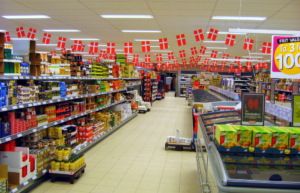News
Supermarkets move to phase out letterbox advertising
This article is more than 3 years old.
Supermarkets, trade organisations and green NGOs want the weekly discount newsletters to be ‘opt in’, rather than ‘opt out’

Salling Group’s new CEO says discount mania is about to strike (photo: Tomasz Sienicki)
We’re all familiar with a mailbox crammed with advertisements, flyers and brochures. While some of us might flip through the weekly offers, many bin them immediately.
So, it’s welcome news that several organisations have issued a joint call for a new system called ‘Advertising – Yes, please’, in which households must opt in to receive paper advertisements.
In the long run, several of the organisations – including the Coop supermarket – want print advertising completely abolished.
300,000 tonnes of CO2
“Denmark is the country in Europe that produces the most waste per person. Meanwhile, we’re in the midst of a serious climate crisis. It’s an obvious area to cut back,” said Lars Midtiby, the head of the Danish Society for Nature Conservation, to DR News.
A study by Mindful Food Solutions in collaboration with Coop revealed that Danish print advertising can be blamed for some 300,000 tonnes of CO2 emissions annually.
“It’s an unnecessary environmental burden. That’s why we want paper advertisements completely phased out,” chimed in Coop’s head of accountability, Signe Didde Frese.
Coop all talk and no walk
Despite Frese’s public announcement, Coop isn’t a trailbrazer here. Dagli’Brugsen’s advertisements are totally digital, while Kvickly and SuperBrugsen have merged their paper advertisements into one to save paper.
In fact, Coop’s chest-beating call to action quickly crumbled when pressed on why it didn’t just axe its paper ads.
“It’s not that easy. We keep each other in an iron grip in the retail trade. The offer newspapers are crucial in driving sales and customer flow,” said Frese.
What’s needed, she said, is an industry-wide legislation change.
Not everyone is pleased
Jens Nicolaisen, the CEO of Sjællandske Media, is unenthusiastic about the proposal.
“Weekly newspapers and the companies that make household advertisements jointly finance delivery and distribution,” he told DR.
“If you have to opt in for adverts, free newspapers will fall under the same scheme. It will be a serious blow to our economy.”
Many Danish politicians share Nicolaisen’s concerns. Venstre’s business spokesperson, Torsten Schack Pedersen, flatly rejected the proposal.
“This will make the distribution of weekly newspapers significantly more expensive and thus weaken our national media,” he said, according to DR.
Scheme already exists in the Netherlands
A ‘Yes, Please’ scheme, that would have tackled the issue on a legislative level, was actually floated in 2020 by the minister of trade and industry, Simon Kollerup – but was shot down under suspicion it breached EU rules.
Since then, several Dutch cities have introduced a similar system. “Now we know that the Netherlands has implemented a similar scheme, there are no legal obstacles,” said Midtiby.
But Danish politicians are sitting on their hands, weighing up the cost of a ‘Yes, please’ scheme to the Danish media against the cost to the environment … under the guise of awaiting permission from the European Commission.
“We can’t take a final position until we have the legal clarification,” Socialdemokratiet spokesperson Christian Rabjerg Madsen told DR.










































